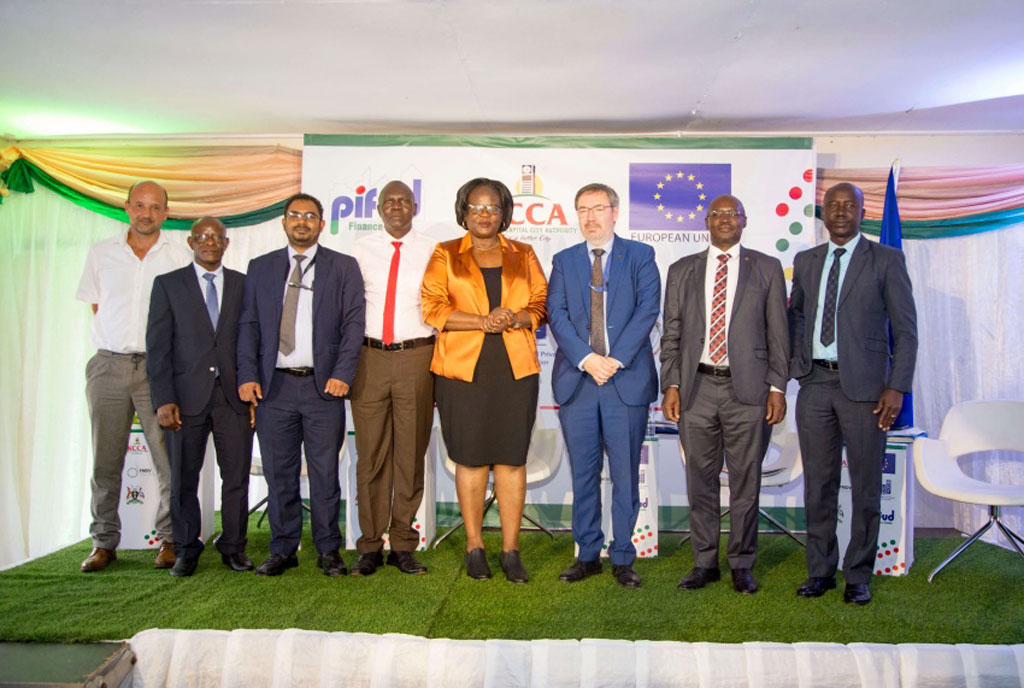KCCA hands over digital tax system to local govts

Kampala Capital City Authority (KCCA) Executive Director Dorothy Kisaka (C) poses for a photo during the handover of the management of the Integrated Revenue Administration System (IRAS) and data center to the Municipalities of Entebbe, Makindye Ssabagabo and Nansana on September 27, 2022 in Kampala. PHOTO/HANDOUT
What you need to know:
- KCCA Executive Director Dorothy Kisaka waxes lyrical of the system’s efficiency in tax administration.
Kampala Capital City Authority (KCCA) has handed over the Integrated Revenue Administration System (IRAS) and data centre to Wakiso District municipalities of Entebbe, Nansana and Makindye Ssabagabo.
At a handover event on September 27 at Makindye Ssabagabo Municipality headquarters, the KCCA Executive Director, Dr Dorothy Kisaka, said the system has already demonstrated its ability to solve local revenue management and administration challenges.
“The manual system was full of corruption from the assessors, and lacked health systems to track whatever was going on. But with this new system, automation of key processes such as taxpayer registration, assessments, payments and revenue reconciliation and accounting, objection and appeals handling has been done well,” she said.
The four-year-old programme, Dr Kisaka added, has also enhanced the performance of local governments as far as service delivery is concerned.
“Taxpayers have increased from 45,000 to 173,678, which is more than three times. There has been increased revenue growth, from Shs2.6 billion to Shs4.7b in Makindye Ssabagabo, and from Shs2.5b to Shs5 billion in Nansana Municipality,” she added.
Mr Ismail Ahmad, the principal inspector in the Ministry of Local Government, appreciated the new system, saying it has eased their work.
“As Ministry of Local Government, the challenge has always been dwindling local revenues. However with the coming of systems such as IRAS, there have been improvements and an upward trend as far as local revenue is concerned,” Mr Ahmed said.
However, he advised all local governments to always monitor the system and ensure sensitisation of the taxpayers about how it works.
Speaking at the event, Mr Lennart Deridder, the team leader for Inclusive Green Economy, a sustainable growth model at the European Union, pledged to continue supporting Uganda’s local governments in digitalising local revenue collections to ensure accountability and good governance of public funds.
“It is our hope that enhanced transparency in revenue collection will result in an increase in revenues generated by these municipalities, which in turn will enable them deliver more services and infrastructure to their population,” Mr Deridder said
Mr Godfrey Ssemwanga, the Makindye Ssabagabo mayor, explained the impact of the new digital tax collection system.
“The cases of corruption and human errors have reduced; the taxpayer now gets all the information quickly on his/her phone. I think this is the best system,” Mr Ssemwanga said.
However, he said that they have also encountered a number of challenges with the system such as not capturing arrears and breaking down.
“When we came for budgeting for this financial year, we realised that we had arrears; there are those taxpayers who did not pay by the end of the financial year and the arrears are not activated in the system hence registering losses,” he said.
Mr Ssemwanga added that sometimes the new system breaks down, bringing work to a standstill.
About tax systems
IRAS was developed in 2019 to cover all local government revenue sources. It was developed by the European Union with support from the World Bank and was first piloted in Nansana, Fort Portal and Gulu City.
The system is user friendly because the taxpayer can easily access it using a mobile phone or a computer.




